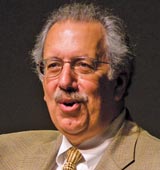|
Executive Interviews: Interview with Richard Boyatzis on The Making of a CEO
January 2009
-
By Dr. Nagendra V Chowdary
 Dr. Richard Boyatzis
Dr. Richard Boyatzis Professor in the Department of Organizational Behavior, Psychology and Cognitive Science at Case Western Reserve University and Human Resources at ESADE 
What is the connection between
emotional intelligence and primal
leadership?
EI enables people to use their emotions
effectively. In that way, resonant
leaders are primal—they deal with
primary processes and they deal with
the most basic of people’s emotions. What is mood contagion and how
prevalent is it in organizations?
What are your research’s key
implications? What is the science of
moods all about? Can it really be
called a science?
|
|
Have you ever been to a party, a wedding
in which everyone was having
fun and you wanted it to last forever?
Have you ever been to a debriefing at a
company where things went wrong
and everyone is blaming everyone
else? In each case, you can see, hear,
and feel the contagion of emotions. It
happens through the mirror neurons
and spindle cells. It happens unconsciously
and very, very fast—in milliseconds. It’s true that everyone (every
leader/CEO) wants to be an inspirational,
inclusive leader rather than
being a depressed, ruthless boss. But
is it not inevitable that off-the-job
events do affect
on-the-job behavior? After all no one
is immune from such biases. However,
are there any suggestions for
CEOs to delineate themselves from
off-the-job events and other lowm
orale inducing
behavior? Are there any best practices
to emulate?
Yes. Yes, Build moremindfulness (see
our 2005 book Resonant Leadership). One of HBR’s best selling articles
is “Reawakening Your Passion for
Work” (HBR, April 2002) authored
by you (alongwith AnnieMcKee and
Daniel Goleman). Can you tell us the
background of that wonderful
work?
David Kolb and I began worrying
about life and career stage theories as
not reflective of how people really
emerge in today’s society. As we
worked on these ideas and started
some research in the late 1980’s, I began
to inclued life and career stage,
cycle, sequence work in all of our
workshops. People need to be aware
of their mid-life crisis, if not, they act
inappropriately—spend too much
money, divorce loved ones, change
jobs the wrong way, etc. The article primarily sought answers
for a simple, yet powerful
question, “Am I really living the way
I want to live?” What are the different
signals that it’s time to take stock?
Can you tell us the strategies to listen
to those signals and take proactive
steps to address this simple question?
Yes, we have an entire book devoted
to it, called Becoming a Resonant
Leader. It came out from HBSP in
March. Who according to you are the 10
greatest business leaders that the
world has ever seen and what qualities
distinguish them from the rest?
Of these qualities how many can be
inculcated through a steady stream
of coaching, mentoring,
handholding, etc.?
Among the best leaders in business in
the world, I would include: Meg
Whitman (E Bay), John Chambers
(Cisco Systems), Ken Chennault
(AMEX), Oprah Winfrey (Harpo Productions),
Belmiro Azevado
(SONAE), John Brown (formerly of
BP), Herb Kelleher and Colleen
Barrett (Southwest Airlines), and the
others who we featured in the 2002,
2005 and 2008 books and related
HBR articles. All of them developed
with substantial coaching and
mentoring from others. It is imperative.
In my Intentional Change
Theory, you can see why.
1.
CEO as Change Agent Case Study
2. ICMR
Case Collection
3.
Case Study Volumes
|
The interview was conducted by Dr. Nagendra V Chowdary, Consulting Editor,
Effective Executive and Dean, IBSCDC,
Hyderabad. This interview was originally published in Effective Executive, IUP, January 2009. Copyright © January 2009, IBSCDC
No part of this publication may be copied, reproduced or distributed, stored in a
retrieval system, used in a spreadsheet, or transmitted in any form or medium –
electronic, mechanical, photocopying, recording, or otherwise – without the permission
of IBSCDC. |
